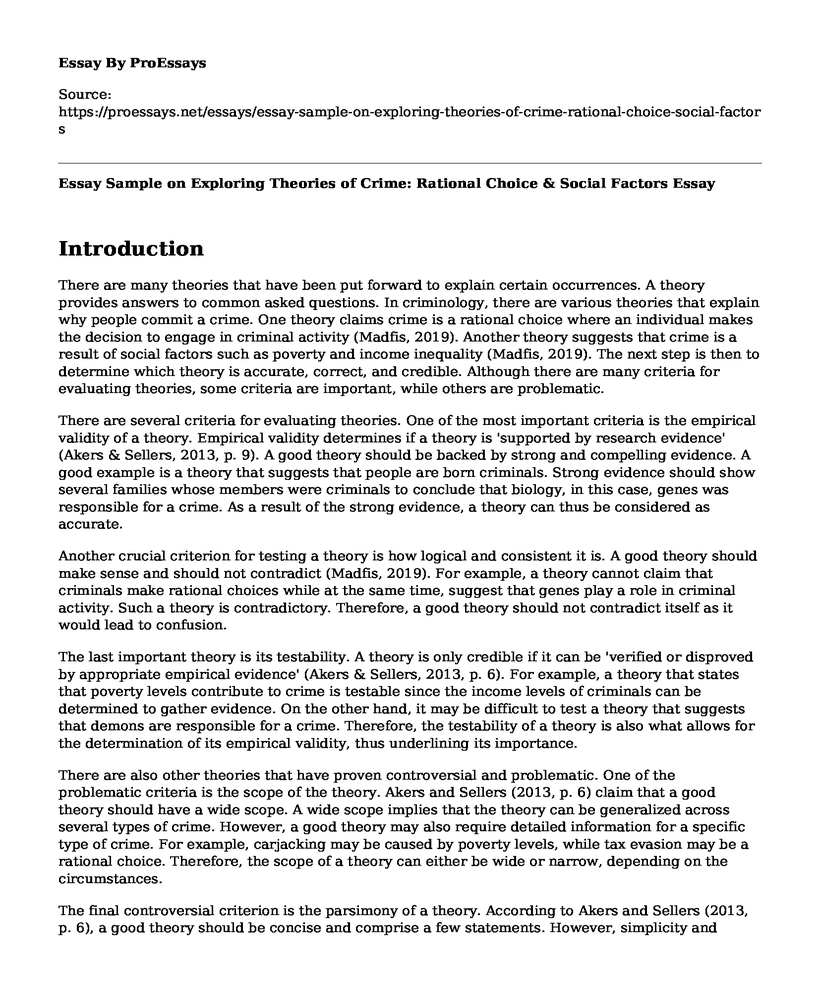Introduction
There are many theories that have been put forward to explain certain occurrences. A theory provides answers to common asked questions. In criminology, there are various theories that explain why people commit a crime. One theory claims crime is a rational choice where an individual makes the decision to engage in criminal activity (Madfis, 2019). Another theory suggests that crime is a result of social factors such as poverty and income inequality (Madfis, 2019). The next step is then to determine which theory is accurate, correct, and credible. Although there are many criteria for evaluating theories, some criteria are important, while others are problematic.
There are several criteria for evaluating theories. One of the most important criteria is the empirical validity of a theory. Empirical validity determines if a theory is 'supported by research evidence' (Akers & Sellers, 2013, p. 9). A good theory should be backed by strong and compelling evidence. A good example is a theory that suggests that people are born criminals. Strong evidence should show several families whose members were criminals to conclude that biology, in this case, genes was responsible for a crime. As a result of the strong evidence, a theory can thus be considered as accurate.
Another crucial criterion for testing a theory is how logical and consistent it is. A good theory should make sense and should not contradict (Madfis, 2019). For example, a theory cannot claim that criminals make rational choices while at the same time, suggest that genes play a role in criminal activity. Such a theory is contradictory. Therefore, a good theory should not contradict itself as it would lead to confusion.
The last important theory is its testability. A theory is only credible if it can be 'verified or disproved by appropriate empirical evidence' (Akers & Sellers, 2013, p. 6). For example, a theory that states that poverty levels contribute to crime is testable since the income levels of criminals can be determined to gather evidence. On the other hand, it may be difficult to test a theory that suggests that demons are responsible for a crime. Therefore, the testability of a theory is also what allows for the determination of its empirical validity, thus underlining its importance.
There are also other theories that have proven controversial and problematic. One of the problematic criteria is the scope of the theory. Akers and Sellers (2013, p. 6) claim that a good theory should have a wide scope. A wide scope implies that the theory can be generalized across several types of crime. However, a good theory may also require detailed information for a specific type of crime. For example, carjacking may be caused by poverty levels, while tax evasion may be a rational choice. Therefore, the scope of a theory can either be wide or narrow, depending on the circumstances.
The final controversial criterion is the parsimony of a theory. According to Akers and Sellers (2013, p. 6), a good theory should be concise and comprise a few statements. However, simplicity and conciseness can be costly. For example, the theory that explains why the earth is spherical as opposed to flat is detailed, with Mathematical computations and formula. Therefore, since human behavior is complex, there may be a need for equally complex theories to explain the cause of crime.
Conclusion
In conclusion, despite several criteria for evaluating theories, some are important, while others are problematic. Therefore there is a need to focus on the important criteria first before considering the problematic criteria. The important criteria include testability, empirical validity, and the logical and consistency of a theory. On the other hand, the controversial criteria include scope and parsimony of a theory. Overall, a good theory should be valid, provide a generalizable explanation, and establish the relationship between two factors such as crime and its cause.
Questions
If we believe that entrepreneurs are born not made, why then should the idea that criminals are born not made be correct?
Why is it difficult for people to let go of their ideologies even when there is new evidence to suggest otherwise?
References
Akers, R., & Sellers, C. S. (2013). Criminological Theories. New York, NY: Oxford University Press.
Madfis, E. (2019). Introduction to Criminological Theory [Video]. Retrieved from class notes.
Cite this page
Essay Sample on Exploring Theories of Crime: Rational Choice & Social Factors. (2023, Feb 17). Retrieved from https://proessays.net/essays/essay-sample-on-exploring-theories-of-crime-rational-choice-social-factors
If you are the original author of this essay and no longer wish to have it published on the ProEssays website, please click below to request its removal:
- Term Paper Example on Insanity Defense
- Gang Violence in Washington DC Research
- Research Paper on Prison Gangs in South Africa
- Outline for Opinion Paper: Legalization of Marijuana
- Essay Sample on Inter-Country Conflict: US & Mexico Border Crisis
- Essay Example on Mother's Right to Refuse Unwanted Healthcare Treatment
- Challenges Faced by Correctional Management: Prison Overcrowding, Funding Gaps & More - Essay Sample







